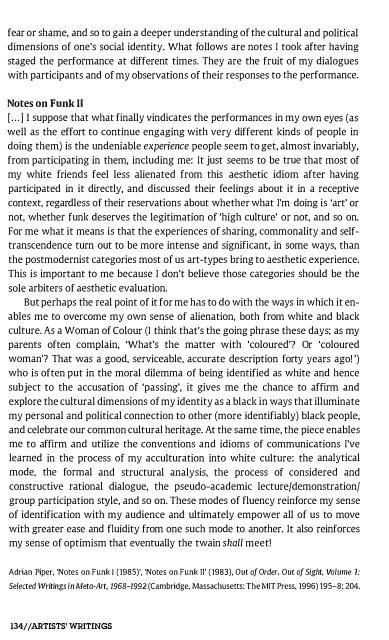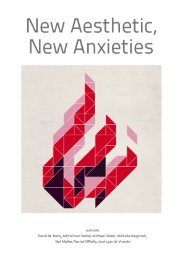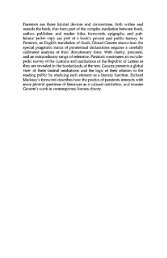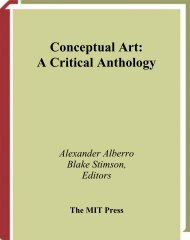Create successful ePaper yourself
Turn your PDF publications into a flip-book with our unique Google optimized e-Paper software.
fear or shame, and so to gain a deeper understanding of the cultural and political<br />
dimensions of one's social identity. What follows are notes I took after having<br />
staged the performance at different times. They are the fruit of my dialogues<br />
with participants and of my observations of their responses to the performance.<br />
Notes on Funk \I<br />
[ . .. ]1 suppose that what finally vindicates the performances in my own eyes (as<br />
well as the effort to continue engaging with very different kinds of people in<br />
doing them) is the undeniable experience people seem to get, almost invariably,<br />
from participating in them, including me: It just seems to be true that most of<br />
my white friends feel less alienated from this aesthetic idiom after having<br />
participated in it directly, and discussed their feelings about it in a receptive<br />
context, regardless of their reservations about whether what I'm doing is 'art' or<br />
not, whether funk deserves the legitimation of 'high culture' or not, and so on.<br />
For me what it means is that the experiences of sharing, commonality and selftranscendence<br />
turn out to be more intense and significant, in some ways, than<br />
the postmodernist categories most of us art-types bring to aesthetic experience.<br />
This is important to me because I don't believe those categories should be the<br />
sole arbiters of aesthetic evaluation.<br />
But perhaps the real point of it for me has to do with the ways in which it enables<br />
me to overcome my own sense of alienation, both from white and black<br />
culture. As a Woman of Colour (I think that's the going phrase these days: as my<br />
parents often complain, 'What's the matter with 'coloured'? Or 'coloured<br />
woman'? That was a good, serviceable, accurate description forty years ago! ')<br />
who is often put in the moral dilemma of being identified as white and hence<br />
subject to the accusation of 'passing', it gives me the chance to affirm and<br />
explore the cultural dimensions of my identity as a black in ways that illuminate<br />
my personal and political connection to other (more identifiably) black people,<br />
and celebrate our common cultural heritage. At the same time, the piece enables<br />
me to affirm and utilize the conventions and idioms of communications I've<br />
learned in the process of my acculturation into white culture: the analytical<br />
mode, the formal and structural analysis, the process of considered and<br />
constructive rational dialogue, the pseudo-academic lecture/demonstration/<br />
group participation style, and so on. These modes of fluency reinforce my sense<br />
of identification with my audience and ultimately empower all of us to move<br />
with greater ease and fluidity from one such mode to another. It also reinforces<br />
my sense of optimism that eventually the twain shall meet!<br />
Adrian Piper, 'Notes on Funk [ (1985)" 'Notes on Funk II' (1983), Out of Order. Out of Sight, Volume 1:<br />
Selected Writings in Meta-Art, 1968-1992 (Cambridge, Massachusetts: The MIT Press, 1996) 195-8; 204.<br />
134// ARTISTS' WRITINGS








